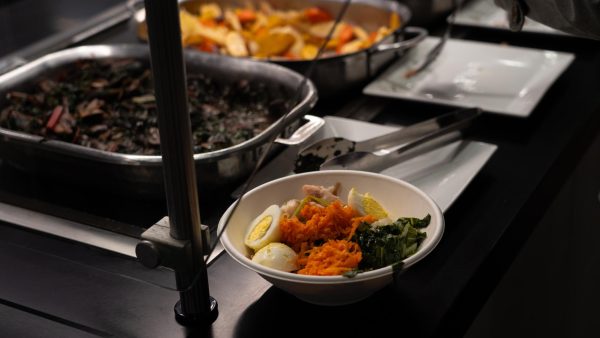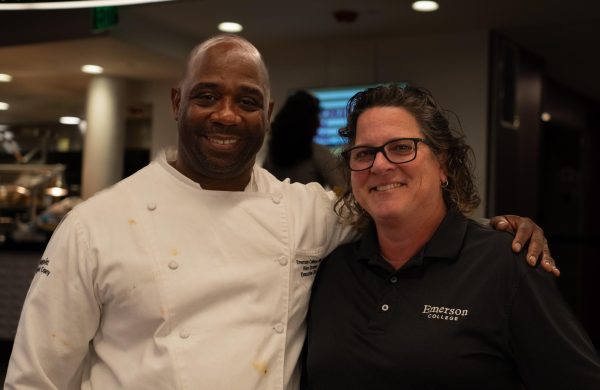On Tuesday, Sept. 23, chefs at the Dining Center were tasked with crafting the entire lunch menu using only ingredients sourced within a 150-mile radius as a part of the “Eat Local Challenge.”
According to Alex Drumm, executive chef of Bon Appétit at Emerson College, the challenge is a way for him and the other chefs to redefine their culinary style each year. Some examples of innovation from this year’s challenge include the use of whole wheat flour to make soba noodles for the pasta station, and the use of yeast to make a pizza dough starter weeks before it was served to students.
“Just simple little ingredients that you would think [are] a staple in your pantry, we can’t use in this challenge, like, even a lemon as seasoning,” said Drumm, adding that salt was the one ingredient exempt from the challenge rules. “We had to think: how do we still make this enjoyable without vital ingredients that we use daily?”
This challenge, which has been held every third Tuesday of September for the last seven years, encourages chefs to be more creative with the ingredients they can acquire from local vendors. Drumm said that it is a part of Bon Appétit’s focus on effectively collaborating with its local communities in best serving meals for Emerson students.

The challenge does include some of the sourcing practices the kitchen staff already use. Drumm said the locally grown produce they receive from these vendors is what creates an outline for the menu that the chefs create.
“It’s almost like the farms choose the menus,” Drumm said. “I will start with an outline of a mix of proteins I want to use, and based on the availability, we, as a group, figure out how we’re going to manipulate these ingredients.”
On a typical day, Emerson College’s chefs make an effort to have about 20% of the food they produce be locally grown, Drumm said. They do this by working with local vendors, like Karabin Farms in Connecticut for tomatoes, Murray’s Chicken from Pennsylvania for their chicken, Ipswich fish from Suffolk for seafood, Mi Tierra from the general New England area for local tortillas, and many more. On Tuesday, their jump from 20% local ingredients to almost 100% supported many more local, often smaller vendors.
“The beautiful thing is [that] it’s like the cycle of life where we get to help our local community [of] farmers and craftsmen,” Drumm said.
For Dawn Sajdyk, Emerson’s resident district manager for Bon Appétit, it’s refreshing to see where the food is coming from and to meet the people who are growing the produce used in the kitchen. She and the kitchen staff focus on prioritizing sustainability and maintaining relationships with local farmers and artisans throughout the year, ethically sourcing food while also bringing high-quality meals to the Emerson community. This is something they’ve been able to accomplish with the help of their parent company, Bon Appétit, which encourages the chefs to use fresh ingredients and produce dishes from scratch.

For the Sustainability Committee at Emerson, food contributes heavily to Emerson’s environmental footprint. Initiatives like the “Eat Local Challenge” can help complement their sustainability work, which includes promoting reusable dishware and proper waste disposal in areas like the Dining Center, Jennifer Lamy, the associate director of the committee, wrote in a statement to The Beacon.
“[It’s] a great way for Emerson to celebrate and support our local community of farmers, producers, and other food vendors,” Lamy wrote.
The mission of the chefs at Emerson is to provide local, healthy meals to Emerson students centered on sourcing local food that reduces environmental impact by cutting down transportation emissions and serving only protein raised naturally, without antibiotics.
“[Bon Appétit] have kind of been pioneers, sourcing sustainable food, [promoting] farm workers’ rights, [and] trying to keep things local and fresh,” Sajdyk said. “[They’re] a very chef-driven company, which is awesome.”
Sajdyk and Drumm emphasized that the dining hall’s approach goes beyond just cooking—it’s about collaboration and respect for where food comes from. That commitment has fostered a team culture where chefs share responsibility for creating meals that reflect sustainability and care for the community, and that’s what makes the program thrive, Drumm noted.
“It isn’t about me, I’m just a spoke in the wheel when it comes to this day. We’ve all contributed,” Drumm said.
Diya Agrawal, a freshman writing, literature, and publishing major from India, appreciates the chefs’ goal to keep all ingredients local, as she gets to experience the flavors Boston has to offer.
“Boston is so rich and has every other cuisine in the world, that you’re always just trying different cuisines,” she said.